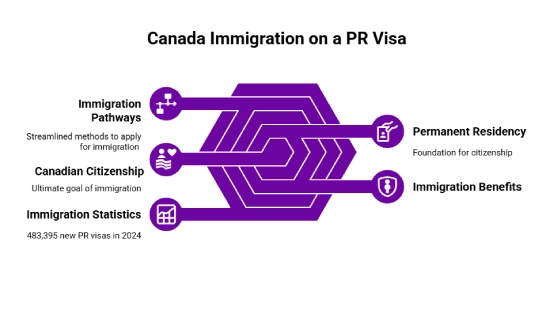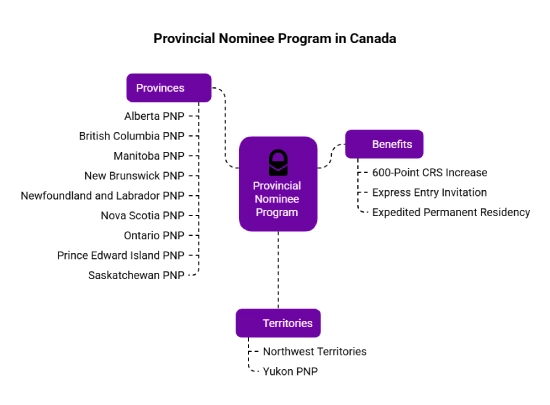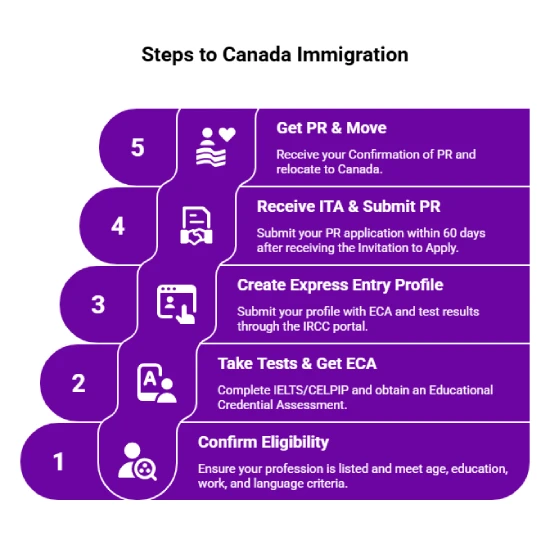Migrate to Canada
Sign up for a free expert consultation
Don't know what to do?
Get Free Counseling
Canada Immigration on a PR Visa
The destination of Canada attracts a high number of skilled immigrants who desire to obtain permanent resident status. The Canadian immigration process stands transparent alongside an excellent standard of living and a welcoming society that provides an organized path for permanent settlement with complete legal rights.

- Canada issued more than 483,395 new PR visas during 2024 as reported by the IRCC.
- The average period for processing Express Entry applications equals six months.
- Canada offers more than 80 distinct immigration pathways which include Express Entry as well as Provincial Nominee Programs (PNP) and Quebec Skilled Worker Program (QSWP).
- Immigrants in Canada receive free healthcare services along with public education and complete work rights.
- Canada PR provides five years of validity which is renewable and leads to citizenship.
Canada Immigration from the UAE
The Canadian immigration system attracts a significant number of UAE residents who choose to move to Canada each year using various programs like:
Canada maintains an open door policy to attract skilled professionals along with entrepreneurs and families who seek a diverse and secure economic environment. UAE residents have the option to file their Canada PR applications independently or with sanctioned immigration consultants.
*Need assistance with Canada immigration? Sign up with Y-Axis for comprehensive support with the process.
Canada Immigration – Express Entry
Canada uses Express Entry as its primary online immigration system to manage applications from skilled workers. The system processes applications for three primary programs which are:
- Federal Skilled Worker Program (FSWP)
- Federal Skilled Trades Program (FSTP)
- Canadian Experience Class (CEC)
Detailed information about the programs are given in the table below.
|
Program |
Description |
|
Federal Skilled Worker Program (FSWP) |
For skilled professionals with foreign work experience who meet criteria such as age, education, work experience, and language ability. |
|
Federal Skilled Trades Program (FSTP) |
For qualified trade workers in occupations like electricians, plumbers, and chefs with a job offer or certification in Canada. |
|
Canadian Experience Class (CEC) |
For individuals with at least one year of skilled work experience in Canada and strong English or French language skills. |
Applicants establish their profile before receiving a score from the Comprehensive Ranking System (CRS). The system conducts biweekly draws to select the top-ranked candidates who can then apply for permanent residency through Express Entry.
*Want guidance to apply for Canada work visa? Let Y-Axis guide you with the process.
Immigration to Canada – PNP
Canada’s provinces as well as its territories receive authority through the Provincial Nominee Program to select specific immigrants for their regions. The main streams of the PNP program are:
- Alberta PNP
- British Columbia PNP
- Manitoba PNP
- New Brunswick PNP
- Newfoundland and Labrador PNP
- Northwest Territories
- Nova Scotia PNP
- Ontario PNP
- Prince Edward Island PNP
- Saskatchewan PNP
- Yukon PNP

The provision of a PNP nomination results in a 600-point increase to your CRS score which guarantees you an Express Entry invitation and expedites permanent residency processing.
Migrate to Canada – QSWP
The Quebec Skilled Worker Program (QSWP) allows people in various professions to establish themselves as residents and employees in Quebec. The Quebec Skilled Worker Program operates through an independent selection procedure which differs from the Express Entry system.
The application process requires two essential steps:
Step 1: Submit an application to Arrima (Quebec’s immigration portal).
Step 2: Pass a points-based selection grid
Step 3: Applicants need to show French language. proficiency although this is not strictly required
Step 4: Quebec issues a Certificate of Selection (CSQ) which allows you to start the permanent residency application process with the federal government.
Latest Canada Draws (Express Entry & PNP) in 2025
The Canadian government will conduct Express Entry draws and PNP selections at fixed intervals until the year 2025. The following trends have become prominent in this period:
- The CRS draw scores for 2025 have fluctuated between 491 and 506 points for general draws.
- The immigration system conducts draws based on healthcare professions and STEM occupations and trade occupations.
- Ontario Alberta and British Columbia provinces have increased their focus on targeted PNP draws.
- Canada has established a goal to receive more than 485,000 immigrants during 2025.
- Express Entry draws will occur twice every month while PNP draws will take place every week.
48,511 Invitations Issued in 2025
Express Entry/ Province Draw
Jan
Feb
March
April
May
June
Total
Express Entry
5821
11,601
13,261
1246
2511
7,405
41,845
Manitoba
325
117
219
31
118
36
846
British Columbia
10
NA
13
5
108
NA
136
Ontario
4
NA
NA
NA
NA
3791
3795
Alberta
NA
551
17
246
414
158
1386
Prince Edward Island
22
87
124
168
168
52
621
Newfoundland and Labrador
NA
NA
NA
256
733
NA
989
New Brunswick
NA
NA
498
477
NA
608
2015
Total
6,182
12,356
14,132
2429
4052
12,050
51,633
Canada Immigration Eligibility
The program requirements for both Express Entry and PNP demand that applicants fulfill the following conditions:
- Have an age below 45 years as their ideal age range • Achieve 67 out of 100 points in the FSWP evaluation system.
- Reach the minimum CRS score required for the most recent selection draws.
- Possess a valid job offer or work in a position that falls under the high-demand category (optional but advantageous).
- Show evidence of English or French language skills through IELTS, CELPIP, TEF assessments.
.webp)
Canadian Immigration Requirements
The documents required to apply for Canada immigration are given below.
- A passport that remains valid.
- An Educational Credential Assessment (ECA) from WES or other authorized institutions.
- The IELTS/CELPIP scores for English or TEF for French.
- The documents which confirm work experience qualifications.
- Candidates need to show funds that exceed CAD 13,757 for a single applicant.
- Applicants must undergo medical exams along with obtaining police clearance.
- Additional requirements are necessary when applying for family or business immigration purposes.
Canada Immigration Points
Two key points systems are employed by Canada:
- FSWP Selection Grid (out of 100): 67 points is the minimum requirement
- Comprehensive Ranking System (CRS) (out of 1,200): Determines Express Entry ranking
The points system allocates scores based on the following criteria:
- Age
- Education
- Work experience
- Language skills
- Job offer or provincial nomination
- Spouse qualifications (if applicable)
Detailed information about the points distribution system for Canada immigration is given in the table below.
|
Factor |
Maximum Points |
Description |
|
Age |
110 |
Younger applicants (18–35) receive the highest points; points decrease with age. |
|
Education |
150 |
Higher education levels (Bachelor’s, Master’s, PhD) earn more points. |
|
Work Experience |
80 |
Points increase with years of skilled work experience (in Canada or abroad). |
|
Language Skills |
160 |
Strong English/French scores in IELTS/CELPIP/TEF provide higher CRS points. |
|
Job Offer or Provincial Nomination |
600 |
A valid job offer can add up to 200 points; a provincial nomination adds 600. |
|
Spouse Qualifications |
20 |
If applying with a spouse, their education, language skills, and experience can contribute points. |
The higher the CRS score, the better are chances of being invited in the Express Entry draws.
*Want to check your eligibility for Canada immigration? Avail Y-Axis Canada Immigration Points Calculator for FREE and instant results.
Canada Immigration Process
The detailed procedure to apply for Canada immigration is given below.
Step 1: Confirm your profession appears in the NOC database and demonstrate that you satisfy the age requirements along with educational and work requirements and language abilities.
Step 2: Take IELTS/CELPIP & Get ECA You need to finish either IELTS or CELPIP English testing while you receive a WES-authorized Educational Credential Assessment (ECA).
Step 3: Create Express Entry Profile. Submit your profile through the IRCC portal which includes your ECA report along with test results and employment details. The system will perform a ranking according to the CRS.
Step 4: Receive ITA & Submit PR Application Successful candidates need to send their complete PR applications before the 60-day deadline which includes the documentation for police clearance and medical examinations.
Step 5: Get PR & Move to Canada After your approval you will receive your Confirmation of PR which enables you to relocate to Canada for your new beginning.

List of Canada Visas for Immigration
The popular Canadian immigration visas are:
- Express Entry PR Visas (FSWP, FSTP, CEC)
- Provincial Nominee Programs (PNPs)
- Quebec Skilled Worker Program (QSWP)
- Family Sponsorship Visa
- Startup Visa Program
- Self-Employed Visa
- Student-to-PR Pathways (Post-Graduation Work Permit + CEC)
Each visa has distinct eligibility requirements, processing times, and benefits.
Canada Visa Processing Time
The visa processing time for various visas are given below.
|
Visa Type |
Processing Time |
|
Express Entry (FSWP) |
6 to 8 months |
|
PNP via Express Entry |
6 to 9 months |
|
Quebec Skilled Worker |
12 to 18 months |
|
Family Sponsorship (Spouse) |
10 to 12 months |
Canada Visa Fees
The detailed information about Canada immigration fees are given below.
|
Applicant Category |
Fee (CAD) |
|
Primary Applicant |
CAD 1,365 (including PR fee) |
|
Spouse/Partner |
CAD 1,365 |
|
Dependent Child |
CAD 230 |
Additional Costs (Estimated):
- IELTS/PTE: CAD 300–350
- ECA (WES): CAD 220–250
- Other: Police clearance, medical exams, biometrics, translation, etc.
Life in Canada for Immigrants
Residents in Canada enjoy a high quality of life through several key features:
- Public healthcare (Medicare) operates without cost.
- The country maintains world-class educational institutions that provide affordable university education.
- The job market in Canada demonstrates extensive opportunities for trained professionals.
- The cities across this multicultural nation offer safety alongside welcoming communities.
- Canada provides new immigrants with comprehensive support through job preparation and settlement programs.
- Permanent Residents of Canada have nearly all the rights of citizens which include social benefit access and legal protection.
Canadian Immigration and Visa Services
Immigration policies within Canada are under the management of the IRCC authority. The system follows a completely computerized and transparent process which evaluates people through their qualifications and accomplishments. The immigration process for applicants from the UAE allows them to apply either through direct submission or by using officially approved consultants. The majority of applicants follow three main paths for their immigration process:
- Express Entry portal (IRCC)
- Provincial nomination systems (online portals)
- Quebec’s Arrima platform
How can Y‑Axis help you with Canada Immigration?
Known for its 25 years of global migration experience Y-Axis stands as the United Arab Emirates top-rated immigration consultancy. Our services include:
- Free profile evaluation
- IELTS coaching as well as ECA guidance
- Express Entry and PNP registration
- Document checklist for visa filing
- Job search and settlement assistance in our post-landing services
Our expert guidance provides a streamlined process for obtaining Canadian PR status.
Looking For Inspiration
Explore what Global Citizens have to say about Y-Axis in shaping their future
Frequently Asked Questions
